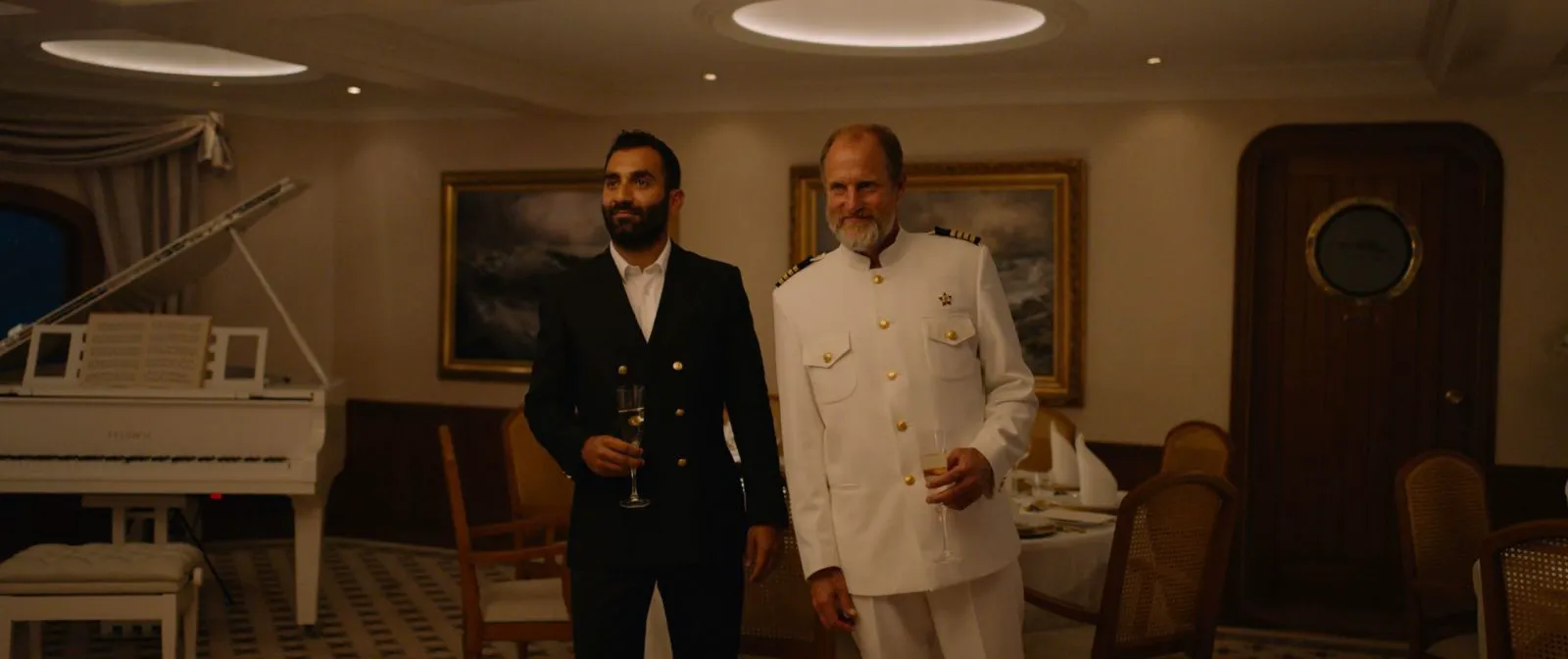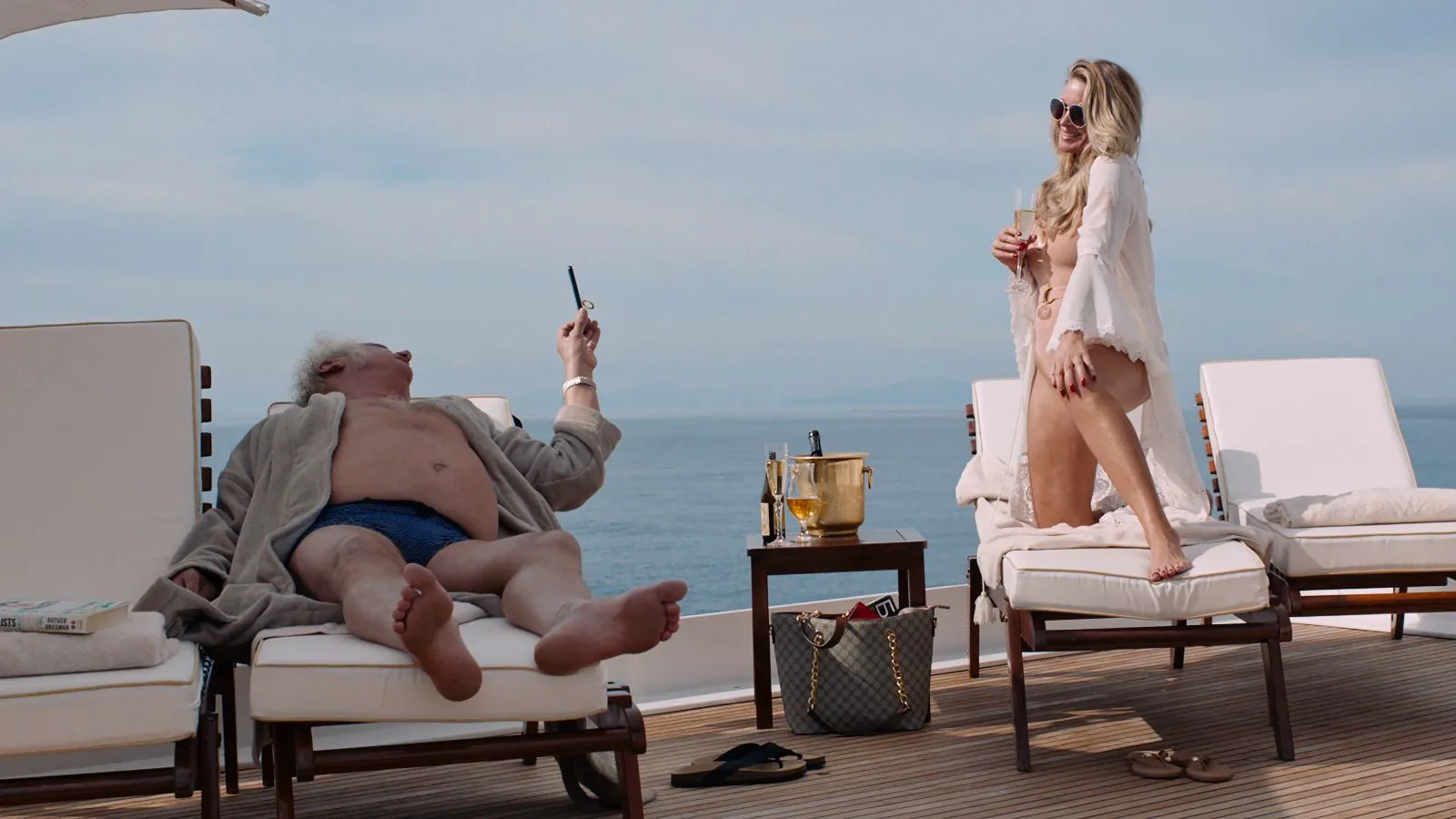Triangle of Sadness: A Scathing Satire of the Super-Rich
Models Alex (Harris Dickinson) and Yaya (Charlbi Dean Kriek) score free tickets to a luxury cruise, where they find themselves surrounded by a cast of caricatures: obscenely wealthy eccentrics who are more like walking punchlines. There’s Dimitry (Zlatko Buric), a Russian oligarch who made his fortune in fertilizer (he proudly calls himself the “King of Shit”), his wife and mistress, a British couple who made their money selling weapons, and a perpetually drunk, Marxist captain (Woody Harrelson). Their days are filled with idle time, the only event of note being the captain’s dinner. It’s during this dinner that the ship is caught in a violent storm, turning the stomachs of everyone on board inside out.

Harris Dickinson as Carl in a still from “Triangle of Sadness”
It’s important to note upfront that “Triangle of Sadness” isn’t Swedish director Ruben Östlund’s best work, despite earning him his second Palme d’Or at the Cannes Film Festival. Some might even argue it’s one of the weaker Cannes winners of the past decade, perhaps only surpassing films like “Dheepan” (2015), “Winter Sleep” (2014), and “Blue Is the Warmest Color” (2013). However, this doesn’t make Östlund’s new film any less interesting. In “Triangle of Sadness,” he remains true to form, once again dissecting the anxieties and hidden struggles of the ultra-privileged through the lens of a male character grappling with a wounded sense of self-importance. In “Force Majeure,” it was a father who abandoned his family in the face of an approaching avalanche; in “The Square,” a museum curator whose phone is stolen. In “Triangle of Sadness,” Östlund chooses model Alex as his victim. Alex hasn’t had a major contract in three years, while his girlfriend, Yaya, commands attention and applause on the runway. Through Alex (and other characters), Östlund explores the shifting gender dynamics in society, highlighting how some are still clinging to outdated roles, peacocking or playing dumb to impress the opposite sex. This is evident in the opening scene where the couple is having dinner at an expensive restaurant: Yaya earns more, but deliberately hands the waiter a blocked card, expecting Alex to pay. He’s initially offended by her manipulation, annoyed by her pettiness (the bill was only around 50 euros), but ultimately accepts the game – what else can he do?
A Cruise to Nowhere

Woody Harrelson as the Captain in a still from “Triangle of Sadness”
In the film’s second act, titled “The Yacht,” Alex and Yaya embark on a luxury cruise where the wealthy passengers languish in each other’s company. The ship seems to be going nowhere, and there’s little to do besides drink champagne and bask in the sun. During a lavish dinner, a storm hits, causing the elegantly dressed guests to vomit profusely. Meanwhile, the perpetually drunk, Marxist captain and the “King of Shit,” a Russian capitalist, engage in a loud debate about the vices and realities of the world. Following this chaotic scene, the ship is attacked by pirates, leaving a handful of passengers and crew members stranded on a deserted island, where their social roles are dramatically reversed: Abigail (Dolly De Leon), the “toilet manager,” becomes the de facto leader, her word law.
Farce and Melancholy

Still from “Triangle of Sadness”
While the first act of the film is relatively serious, the second and third acts descend into farce. Östlund embraces this absurdity from the outset, dividing the film into chapters, a technique often employed by “master filmmakers” (like Lars von Trier) when contemplating the human condition. Östlund is aware of the expectations surrounding him as a festival darling and plays into them. We see echoes of European symbolism (the ship as a metaphor for Europe, à la Fellini), feminist commentary from a male perspective (reminiscent of Trier), and critiques of capitalism (in the vein of “Parasite”) – a full package. However, much of this feels superficial, almost irrelevant to the core of the film, serving more as attention-grabbing spectacle, like the vomiting scenes that feel more at home in a low-brow American comedy, yet somehow intriguing within the context of the Cannes Film Festival.
What truly matters is what Östlund carries over from his previous works: a sense of melancholy stemming from the meaninglessness and absurdity of existence, people driven mad by privilege, petty squabbles, valuable conversations about nothing, a vulnerable protagonist, and a documentary-like observation of space. While Östlund employs the somewhat cliché metaphor of a sinking ship, he presents it from an unusual angle: the ship rocking on the waves, its pristine corridors and halls empty, alien to human presence. The cruise passengers are hollow shells, with nothing of substance to offer each other. Only Alex, whose sole talents seem to be smiling and flexing his pectoral muscles, possesses a kind heart. The director mocks all of his characters, but he seems to have a soft spot for his vulnerable men. They struggle in a world where they can’t simply kill an animal or bring home a pile of money to win over a woman – something more is required, something they’re not yet capable of. This subtle message is buried beneath layers of chaos, vomit, and pseudo-intellectual drunken ramblings. But that’s life, where a banana duct-taped to a wall can sell for $120,000.